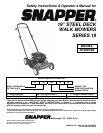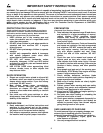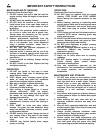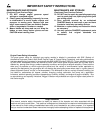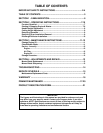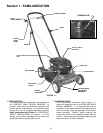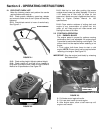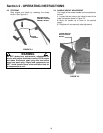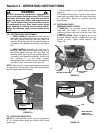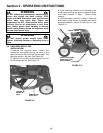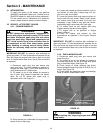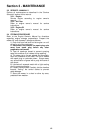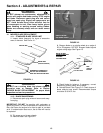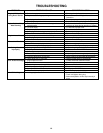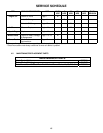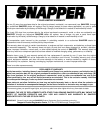
4
IMPORTANT SAFETY INSTRUCTIONS
MAINTENANCE AND STORAGE
(Continued From Previous Page)
7. DO NOT change engine governor speed
settings or overspeed engine.
8. Check grass bag assembly frequently for wear
or deterioration to avoid thrown objects and
exposure to moving parts. Replace with new
bag if loose seams or tears are evident. Replace
slider or bag adapter if broken or cracked.
9. Mower blades are sharp and can cut. Wrap the
blades or wear heavy leather gloves and use
CAUTION when handling them.
MAINTENANCE AND STORAGE
(Continued From Previous Column)
10. DO NOT test for spark by grounding spark plug
next to spark plug hole; spark plug could ignite
gas exiting engine.
11. Have machine serviced by an authorized
SNAPPER dealer at least once a year and have
the dealer install any new safety devices.
12. Maintain or replace safety and instruction labels
as necessary.
13. Use only genuine SNAPPER replacement parts
to assure that original standards are
maintained.
Usage Statement
This manual contains safety information to make you aware of the hazards and risks associated with the
machine and how to avoid them. This machine is designed and intended to be used and maintained according
to the manual for finish cutting of established lawns and is not intended for any other purpose. It is important
that you read and understand these instructions thoroughly before attempting to start or operate this equipment.
Engine Power Rating Information
The gross power rating for individual gas engine models is labeled in accordance with SAE (Society of
Automotive Engineers) code J1940 (Small Engine Power & Torque Rating Procedure), and rating performance
has been obtained and corrected in accordance with SAE J1995 (Revision 2002-05). Torque values are derived
at 3060 RPM; horsepower values are derived at 3600 RPM. Actual gross engine power will be lower and is
affected by, among other things, ambient operating conditions and engine-to-engine variability. Given both the
wide array of products on which engines are placed and the variety of environmental issues applicable to
operating the equipment, the gas engine will not develop the rated gross power when used in a given piece of
power equipment (actual "on-site" or net horsepower). This difference is due to a variety of factors including, but
not limited to, accessories (air cleaner, exhaust, charging, cooling, carburetor, fuel pump, etc.), application
limitations, ambient operating conditions (temperature, humidity, altitude), and engine-to-engine variability. Due
to manufacturing and capacity limitations, Briggs & Stratton may substitute an engine of higher rated power for
this Series engine.



